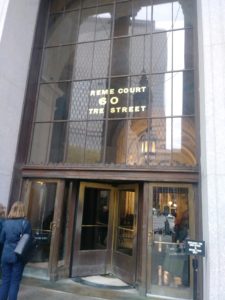For Lysander Spooner University, Antigovernment News, and Justice Travelers
Lower Manhattan, New York, New York. Oct. 22. It was supposed to be the trial of the century.
But a New York Daily News article published on October 21 was entitled “The incredible collapsing ‘#ExxonKnew’ climate change lie”
The “Exxon Knew” case began with much fanfare after 2012 when a group of 20 Democratic state attorneys general conspired at a secret meeting in La Jolla,California to bring about the demise of the largest oil company in the world.
There were startling headlines. ExxonMobil had concealed the science of global warming from the public, it was said. There were supposedly whistleblowers and recently-unearthed company memos from the 1970s or ‘80s revealing Exxon’s (or Mobil’s) attempted coverup. A book, and then a movie entitled “Merchants of Doubt” told how the fossil fuel giants were secretly funding “climate denial” research to confuse the public about the supposedly well-settled science of catastrophic climate change.
Subpoenas flew and teams of investigators poured over ExxonMobil’s memos and emails for 3 years. Exxon turned over 4 million documents. It became known that the New York Attorney General’s investigation was being funded by environmentalist interests and even Michael Bloomberg and the Rockefeller Foundation.
But by 2018, when the “Exxon Knew” litigation began in earnest, the story had been exposed as mostly a work of science fiction. ExxonMobil has never spent more than the paltriest sums on skeptical science. In fact the oil giant has spent billions promoting and supporting the “consensus” theory. Exxon’s websites have made clear for years that the company “believes” in the climate change religion. ExxonMobil advocates carbon regulations and even supports the Paris Accords.
(Interestingly, ExxonMobil’s refusal to defend itself from the alleged consensus science begs the question of whether ExxonMobil has violated its fiduciary duty to its shareholders to fully investigate the weaknesses behind climate alarmism. The company may well face shareholder lawsuits in the future over its failure to challenge the climate doomsday narrative.)
By 2019 the “Exxon knew” allegations had fizzled into mere claims that Exxon used sloppy accounting in its own appraisals of its oil and gas reserves in light of likely future CO2 regulations.
TRIAL BY JUDGE NOT JURY, IN STATE RATHER THAN FEDERAL COURT
The setting for this whittled-down trial is the old New York Supreme Court building in lower Manhattan. (In New York, trial courts are “supreme” courts and what most Americans would call a state supreme court is known as the Court of Appeals.) The judge, Barry Ostrager, is trying the case himself, as both Exxon and the State have opted to forego a jury trial.
The diminished scope of the “Exxon Knew” case did not seem to deaden the hubbub surrounding the trial on Tuesday afternoon. The courtroom was packed, with more watching a feed from an overflow room on the third floor of the courthouse. Reporters and lawyers were everywhere.
A youngish State attorney led the proceedings in a rapid yet monotone delivery. Exxon kept two—or maybe three—sets of books regarding the future valuation of many of the company’s assets, he stated. While Exxon reassured the public that it was preparing for higher future regulatory costs, the company’s actual operations assumed that climate change regulations would stay constant and low.
This is all that remains of the once-heralded “Exxon Knew” allegations.
ExxonMobil’s lead attorney said Exxon did nothing wrong. “Absolutely nothing.” “For many years, ExxonMobil has recognized that climate change is real and must be addressed.” The mentions of future $80-per-carbon-ton costs were merely cash flow sheets for future projects which did not exist yet. Such figures were never on any balance sheet and no investor ever relied on them.
Trial continues tomorrow with witness testimony.


